
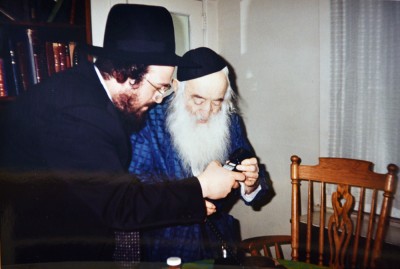

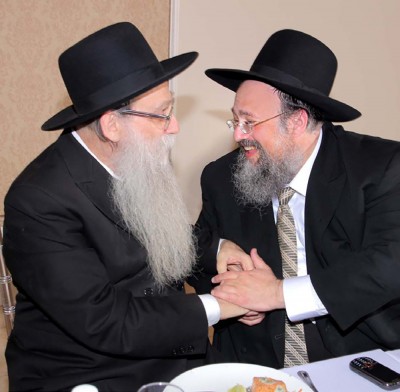

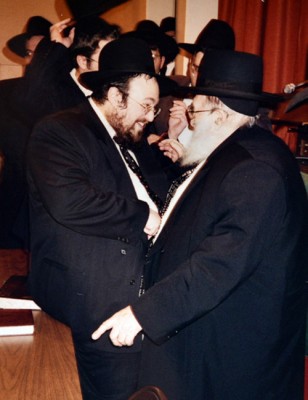
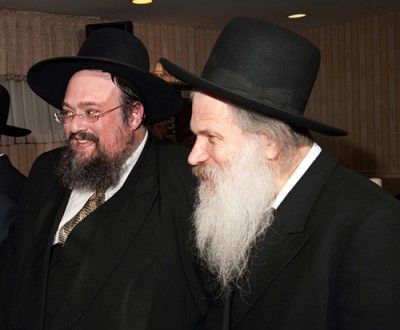
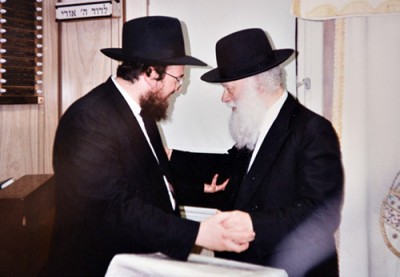
Queens has become synonymous with Bukharian Jewry, especially Flushing, N.Y. But Judaism is defined by the Torah, and it becomes clearer by the day that Torah is firmly taking root in the Bukharian Queens community like never before. We now have so many students devoting their life to the Torah. Even more telling, many of the students of the Torah are businessman and professionals, setting time aside to join classes in the mornings and evenings. How did this start and where did it come from? Past interviews covered this phenomenon from many different angles. This interview however, covers it from a more ‘local’ source. Rabbi Aharon Walkin Shlita comes from an illustrious and well-known European Rabbinical family. His intimate involvement with the development of our community is intertwined with his own life experiences which paint a vivid picture of Torah in America.
ME: Shalom Rabbi Walkin, thank you for agreeing to give our readers a very generous look into your family and work. Rebbi comes from a very well-known and illustrious line of great Torah scholars. Can Rebbi begin by giving our readers some context?
R.A.W: Sure. I grew up in Queens even though I was born in Brooklyn; my family moved when I was one years old. My grandfather was a Rav in Crown Heights and my Bris was in Crown Heights. I had the good fortune of having Rav Moshe Feinstein zt’l as my Sandek.
I grew up in Kew Garden Hills and my Grandparents lived in Kew Gardens. We eventually moved there to be closer with them. However, though I was born here, my family actually originated in Europe. My great-grandfather was the Pinsker Rav, and my Grandfather was the Lukatcher Rav. My father was born in Poland before World War II. During World War II, the family relocated to Shanghai.
ME: The Pinsker Rav is an extremely reputable title, Can Rebbi please elaborate a little more on his great-Grandfather?
R.A.W: Yes. He was a great Talmid Chaham, and actually his last job in public life was the position of Rav of Pinsk.
ME: What was his full name?
R.A.W: Aharon Walkin. I am named after him. I carry his name humbly since I don’t feel I do him justice, though I do try my best [light laughter]. He was indeed known as a great Gadol B’Yisrael. What isn’t clear is how he passed away. The full discussion is for a different time, but some accounts claim that he was murdered in the Holocaust while others suggest that he perished in an old Jewish Ghetto.
His son is Rav Shmuel, who was the Rav of Lukatch. He fled the War by staying in Shanghai and eventually made his way to Crown Heights and was elected Rabbi. He eventually moved to Kew Gardens, Queens and was a Rav here for the remainder of his life.
In speaking to you and your readers, I would like to stress that this interview is an opportunity for me to discuss, more than anything else, the great work that is being done here in Queens. I’m a little less interested in discussing personal events because I feel that the focus should really be on the bigger picture.
ME: I understand. The reason I like to ask about Rebbi’s background is because our readers would benefit from context when we discuss the next point, which is the universal rule that greatness in Torah requires effort, no matter whom you are or where you come from.
R.A.W. Right that is always true [smiles very deeply]. Chazal tell us that if a family produces three consecutive generations of Torah scholars, then the Torah is guaranteed to ‘returns to its roost’ and the fourth generation will most likely produce Torah scholars as well. I have three generations, including my father who is a Gadol baTorah, Hagaon Rav Moshe Walkin. However, no one can come along and claim a monopoly on Torah. Torah needs to be acquired with mesirut nefesh and a lot of work and sacrifice. And this effort is measured for each person, individually. For some people, the sacrifice can be as simple as coming to Yeshiva to learn.
In this community particularly, I feel that the effort expended is the decision to just come to Yeshiva and learn. There are so many distractions and competing mindsets that it’s truly impressive that people in the Bukharian community take out time to learn Torah in Yeshiva. Parenthetically, people ‘born into the system’ may have to struggle with other kinds of impediments. Torah takes a lot of will power, it’s never easy. The Medrash Tanchuma states that one who learns Torah clearly loves Hashem, because otherwise he would not be able to put in the necessary dedication. There is so much going on in life and it is easy to become swamped. Hashem grants success to those who muster devotion, and that devotion is put to the test no matter whom you are or where you come from. After careful analysis, you will see that really, it is all about nurturing a love for the Torah which will guide you past all difficulties. The Gemarah tells us that everyone has difficulties, but the Talmid Chacham, his difficulties stem from toiling in Torah.
ME: So that would be how you categorize your ascent in Torah? You climbed and climbed with unceasing toil and love?
R.A.W: Yes. Even though I came from a lineage of Rabbanim who were all great giants of Jewry, each one of them worked very hard. Everyone has a ladder that he must climb. Devotion and love is the cornerstone of this growth.
ME: It is very reassuring to hear that everyone shares a struggle in the toil for Torah. I must admit that when I was younger I was envious of my friends who came from very well-established and old-European Torah families. I felt that they did not need to work as hard as myself.
R.A.W: Every Jew has a special Neshama, a soul which thirsts for Torah. This inner love is ready to spark devotion if only it were cultivated properly. There is a beautiful psalm which describes how the soul longs to be in the shade of G-d’s Hand to know all the secrets of His Torah. A Jew has a tremendous desire to connect to the Torah, and the way to tap into that is with feelings of joy.
ME: Is this Rebbi’s secret recipe for his students? Rebbi has a certain reputation when it comes to teaching Torah.
R.A.W: [smiles] I give my heart and soul when I give over Torah to my students. They also feel the joy in learning in the Yeshiva. Once a Jew has that fulfillment, then his soul delights in the Torah and he feels the difference. This method of Torah learning allows students to withstand all the difficulties in the world. As the Baal Shem Tov said, every Jew has three loves, Ahavat Hashem and Ahavat Yisrael and Ahavat Hatorah, which are the core of every Neshama. Our Yeshiva is meant for that and we try to ignite the inner spark flickering in every Jewish heart. This is the gift that we try to give our students in Yeshiva, and it will give them happiness all their life.
The Bukharian people have an enormous heart, and when they see sincerity they resonate with it very well. That is why when we teach heart to heart, our students gush with love for the Torah. Beyond this, it’s not really something I can explain or describe. It is just a fact that when Torah drips into the thirsty heart, the heart experiences happiness.
ME: What do you mean by that last point? It seems perfectly understandable on its face that someone who is interested in Torah would be happy when he studies it.
R.A.W: An important point to make is that the happiness felt by the heart of a Torah scholar outweighs the normal satisfaction of gratified curiosity. The level of happiness and content for a Torah scholar is actually the key to our nation’s survival throughout our difficult history. Most nations that would go through a similar ordeal would not survive and thrive. There is something deep in the Jewish Neshama which needs to connect with the Torah, a true and deep love for G-d’s Connection. We are here to tell the person, “listen to your Neshama, and just listen to what your soul pines for”. The Yeshiva helps the student by taking away the clutter of the world. There is also a lot of spiritual sound out there which needs be heard beyond the nonsense.
I want to take this opportunity to thank certain people who are working day and night to allow this spirituality to penetrate the community. Hashem sent the Bukharian community two angels. He sent Rav Ilan Meirov, a Talmid Chaham with great leadership qualities. He has true mesirut nefesh in his learning and teaching. He also sent his brother Yaniv Meirov, a man with the biggest heart I ever saw. I also feel that I am going on the coattails of Rabbi Haimov, who started the movement of Yeshivos for Bukharians. He put in so much effort, both physically and monetarily for the community; he was the Rosh and Rishon. He is a role model for me and everyone. He was the one who started me out in the community, gave me students here to teach. More boys came, and more students were produced. These are the people who I owe a lot to.
ME: Who are Rebbi’s teachers? Who gave Rebbi his method of teaching which he implements in the Yeshiva?
R.A.W: I was always devoted to my Rebbeim and I used to study them and their every word like it was a treasure. There was the Gaon Rabbi Yitzchak Isaac Leibis, who was the head of the Rabbinical Council (Igud Harabonim). He was a friend of the family with my grandfather; I gained my Semicha from him. He had a tremendous mind, was a tremendous gadol in learning. He was wise in Torah and also very wise in the worldly. He was extremely perceptive and was my role model in Halacha.
I was also extremely close to Hagaon Rabbi Pinchas Scheinberg. I studied him in is life and his Hanhaga (mode of living). He had a lot. He had greatness in halacha and learning. I put him on a pedestal and learned from him. After that I had a Rebbi who I was extremely close to, who took the place of my grandfather whom I was also extremely close with. Hagaon Rav Avraham Pam took the place of my grandfather Rav Shmuel Walkin after he passed. This might not be the time and place to discuss how I met with all these people, but Rav Palm was also like a father to me. My Rebbi regarding how to decide Halacha was Hagaon Rav Yisroel Belsky from Torah Vodaath. Similarly, I also learned much halachah and psak from Hagaon Rav Dovid Feinstein.
In the Yeshiva, I was close to many of the Roshei Yeshivos. Because I had a strong background in the Litfishe style of learning I was able to develop a relationship with many of these people, including Hagaon Rav Shmuel Birnbaum. My Rebbi in Yeshiva was Hagaon Rav Shlomo Feivel Shustel from Torah Temimah.
The formula that guaranteed the success for all of these teachers, and the formula which we bring to our Yeshiva is absolute love for the Talmid. You need to be there for them and worry about them and care for them and love them like they are your own children.
ME: That is remarkable dedication. How did Rebbi gain this perspective regarding such love?
R.A.W: My grandfather. He had a lot of love for me and it left a lasting impression on me. I also feel that I was Zoche (fortunate) along the way to have angels from heaven aid me.
In a sense, I feel like I was guided towards the Bukharian community. Why? I don’t know. But I look at this as my mission, my marching orders from Hashem. Baruch Hashem we have had tremendous success in the past. Miracles after miracles, and I see it every day how Hashem builds the Torah through us and teaches his ways through the Yeshivos. In a sense this interview is really not about me at all but rather the Yeshiva we now have and how it came to be in the Bukharian Queens community. The Torah in the Bukharian community is flourishing by the day. The day will come when the Bukharian community will have a Yeshiva, Chazaq’s yeshiva, Yeshiva Beis Nosson Meir. It will be just as great and famous as the others, just as illustrious. We will go full force with all our heart and I know that Hashem will guide us and continue to build the Yeshiva with us. May Hashem give us the continued strength to continue the work and spread His Torah.
By Adam Suionov
Interviewing Harav Aharon Walkin Shlita – Rosh Hayeshiva of Yeshiva Gedolah Beis Nosson Meir of Queens
Typography
- Smaller Small Medium Big Bigger
- Default Helvetica Segoe Georgia Times
- Reading Mode




